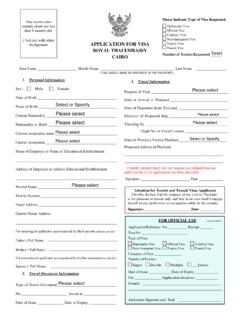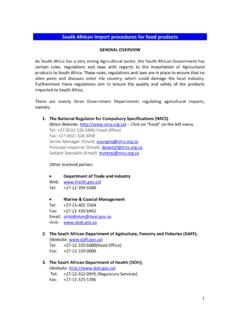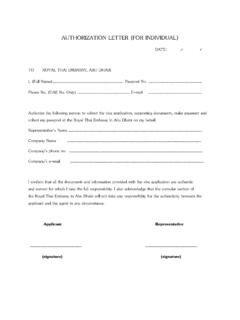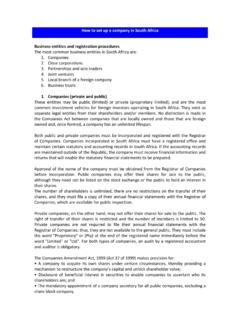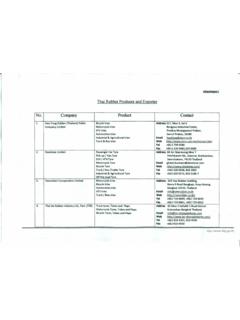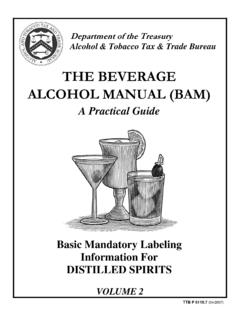Transcription of Food Beverage Industry 1. Market Information - Thai Embassy
1 Food & Beverage Industry 1. Market Information South Africa is a food self sufficient country, with the bulk of the population's food needs produced locally from raw materials. SA's well developed food and beverages Industry has also become a global player. South Africa's agriprocessing sector consists of 11 downstream agricultural sub sectors, including meat processing, preservation of fruit and vegetables, dairy products, and canning and preserving of fish. Major international agriprocessing companies with a presence in South Africa include: Cadbury Schweppes, Coca Cola, Danone, HJ Heinz, Kellogs, McCain Foods, Minute Maid, Nestl , Parmalat, Pillsbury, Unilever and Virgin Cola.
2 The food Industry accounts for the largest section of the South African manufacturing Industry . Consolidation and associations with international companies have been trends in the Industry , creating access to new technology and expertise, while allowing the foreign companies access into the South African Market . The local Beverage Industry supports 32 independent microbreweries, but continues to be dominated by South African Breweries (SAB). The soft drink Industry is dominated by Coca Cola, who operates through Amalgamated Beverages Industries (ABI). South Africa is the 7th largest producer of wine in the world. The local alcoholic Market is dominated by beer, followed by sorghum beer, natural wine, brandy, cane and grain spirit, whisky, fortified wine, sparkling wine and alcoholic fruit drinks.
3 2. Customs duties for HS Other Item CD Decription Unit General EU EFTA SADC 4 Other li 5% + Notices Effective Date 11 eb 2009 3. Regulations labeling requirements The label must be in at least one of the official languages of South Africa (this includes English). The label must include the following Information : 2 Name of the product Name and address of the manufacturer, packer, seller, importer, or person on whose behalf the foodstuff is pre packed; Instructions for special storage conditions, if applicable; The product s country of origin For more Information on labeling requirements , please see the Foodstuffs, Cosmetics and Disinfectants Act of 1972: Regulations Relating to Labelling and Advertising of Foodstuffs here: GM (Genetically Modified) Food labeling : Regulations on labeling for genetically modified foods and foods containing genetically modified organisms can be found in the Regulations Relating to the labeling of Foodstuffs Obtained Through Certain Techniques of Genetic Modification published in the Government Gazette No.
4 25908 (January 16, 2004). These rules require that a genetically modified (GM) food must be labeled as such if it differs significantly from the currently existing food/ Beverage in: Composition, Nutritional Value, Mode of Storage, or Mode of Preparation or Cooking The definition of a genetically modified food includes: Foods that contain genetically modified organisms (GMOs). Foods that contain GM genetic material/protein Foods obtained through genetic modification but not containing any genetic material/protein For more Information , please visit the Department of Health s Food Control Directorate online at: Required Documents An Import Certificate is required in order to import a liquor product in bulk/bottles (excluding beer) to South Africa.
5 However, the importer must only apply for this once in the lifetime of the product, except when products in a separate shipment 3(or consignment ) differ in container, composition, labeling , trade name or bottle size (only composition applies in the case of bulk imports). This certificate (or a copy) must be provided to release a consignment from Customs. This certificate can be obtained from the Liquor Products division. A Certificate of Removal is required when the importer wishes to sell the liquor product (only applicable to bottled products) in South Africa. This certificate is necessary for each shipment. This can be obtained from Quality Audit Division (wine inspectors).
6 Permission for blending of liquor imported in bulk should be obtained when liquor products are imported in bulk and the importer intends to blend the overseas product with a South African or other overseas product. This permission is also necessary should the importer want to break down the bulk product with water. Permission to sell liquor imported in bulk after bottling is necessary if the importer wants to sell the product after blending (including water) and bottling. Licensing There are various divisions within the South African government that enforce the Liquor Products Act of 1989, which concerns the import and export of liquor products.
7 The Directorate of Plant Health Quality is the main regulator, while other aspects related to importation are handled by the Department of Trade and Industry (antidumping, security reasons, etc.) as well as the Department of Health (food safety). An Import Certificate serves as preliminary approval for importing specific liquor products (bulk or bottled). The application for this certificate must be accompanied by a sample consisting of at least 750 ml of the product in question, or in the case of a bottled import, the sample must be submitted in the labeled container in which it will be This sample must be delivered to the office of the Liquor Products division, located at Quarantine Station outside Stellenbosch.
8 A chemical analysis will be performed on the sample that is provided to the office of the Liquor Products division, unless the importer provides an acceptable Analysis Certificate issued by an official laboratory in the country of origin. In the case of bottled products, the label on the bottle will also be evaluated to ensure that it complies with the Liquor Products Act of 1989. In the case of a bulk product, the label will be assessed when the application for a Permission to Sell certificate is received. After receiving approval from this division, consignments of the product may begin to be imported. 4 Import Procedures At least 48 hours notice must be given to the Quality Audit division every time a shipment (or consignment ) of liquor will enter South Africa.
9 Once it arrives, the Importer must present the Import Certificate and obtain a pass from Quality Audit. A Certificate of Removal is also necessary if planning to sell or distribute the imported products, and this must be obtained for every consignment that arrives in South Africa. The consignment will be unpacked under the supervision of an inspector from the Quality Audit division. The certificate must be accompanied by a min. 750 ml sample (drawn from the consignment by the inspector), as well as the necessary certificates of origin, age, [and] composition/cultivar, as mentioned in the Liquor Products Act. For products that arrive in bulk, a Certificate of Permission for blending of liquor imported in bulk and/or a Certificate for Permission to sell liquor imported in bulk after bottling may be necessary.
10 In order to learn more about the requirements and steps that must be taken for these last two certificates, as well as to see the fees associated with all certificates mentioned above, please see pgs. 6 and 7 of the Import Manual for Participants of the Import Trade; this can be downloaded at Click on Liquor Products in the left column, and download the Import Manual listed on the right under Procedures to Import Liquor Products. Taxes/Tariffs For the most current tariffs and taxes applied to imported products for this country, please visit the Online Tariff Database provided by Tariffic at: , and click on On The Fly Tariffeed.


